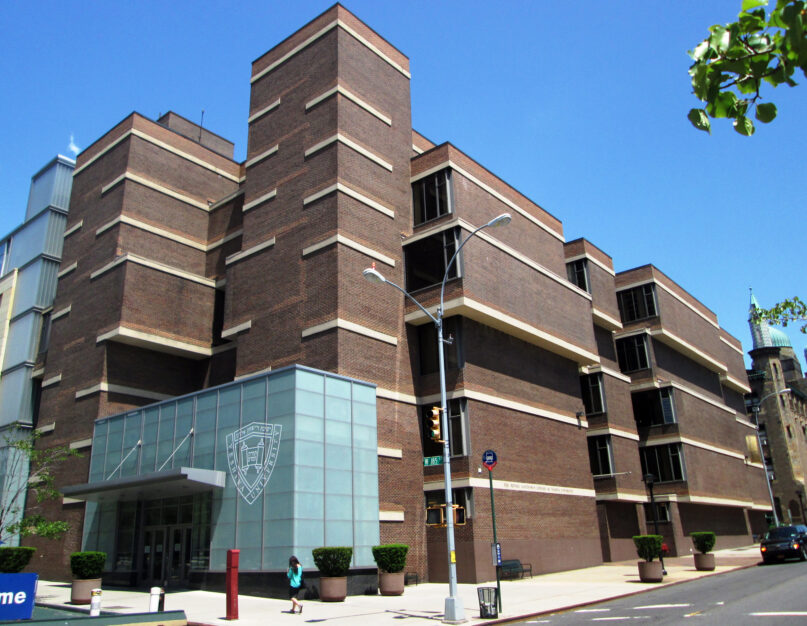(RNS) — Two weeks ago, Yeshiva University announced that it had settled its long-running dispute with members of the YU Pride Alliance and agreed to the establishment of an LGBTQ club on campus. Last week, Ari Berman, president of the Orthodox Jewish university, issued a statement denouncing news organizations for suggesting that Yeshiva had changed its position.
What’s going on here?
In 2021, the Pride Alliance sued Yeshiva for refusing to recognize it as an official student organization. In 2022, a state judge ruled in favor of the alliance and ordered the university to recognize it. Yeshiva immediately appealed to the U.S. Supreme Court to intervene, but the high court said the case first had to make its way through the New York state courts.
At the crux of the legal dispute was whether Yeshiva is a “religious corporation” under New York law. The state’s appellate courts agreed with the judge that the university is not — and therefore isn’t entitled to an exemption from New York City’s public accommodations laws.
In the meantime, 1,600 members of the Yeshiva community signed a letter urging recognition of the club, as did faculty from some of the university’s graduate schools. The university briefly suspended all student clubs, then announced creation of a club for LGBTQ people that no LGBTQ people joined, in part because its designated supervisor, Rabbi Hershel Schachter of the school’s theological seminary, had previously denounced homosexuality.

For reasons we may ponder, Yeshiva chose not to go back to the federal courts, thereby leaving itself under an obligation to comply with the state court’s ruling.
The March 20 announcement of the settlement reads in its entirety:
The parties have reached an agreement and the litigation is ending. Current students will be implementing a club, to be known as Hareni, that will seek to support LGBTQ students and their allies and will operate in accordance with the approved guidelines of Yeshiva University’s senior rabbis. The club will be run like other clubs on campus, all in the spirit of a collaborative and mutually supportive campus culture.
Shortly thereafter, a statement from a university spokesman was appended to the announcement claiming that “the students who filed the lawsuit had actually agreed to implement the club envisioned and approved by Yeshiva in 2022.”
A Pride Alliance spokesman told The New York Times, however, that the settlement “went far beyond” the club that Yeshiva had proposed earlier. The next day, an attorney representing the Pride Alliance told the Jewish newspaper Forward that the agreement allowed the students to identify the club with the letters LGBTQ and to name their own adviser. The newspaper quoted a university spokesman as saying the agreement had been “approved by senior rabbis.”
Not, apparently, by Rabbi Schachter, who at a dinner of the seminary a week later read a statement opposing creation of the club. At the same dinner, Berman read his own statement, later emailed to students, apologizing for the rollout of the announcement.
“The Yeshiva has always conveyed that what a Pride club represents is antithetical to the undergraduate program in which the traditional view of marriage and genders being determined at birth are transmitted,” he declared. The new club was intended for “students who are striving to live authentic, uncompromising halakhic lives” and was agreed upon “by all of the parties to be in accordance with halacha [Jewish law], consistent with the rabbinic guidelines of the senior Roshei Yeshiva [professors of Talmud].”
To this, the members of the Pride Alliance reacted mildly. “Hareni is excited to begin its work supporting LGBTQ students and allies,” it said in a statement. “We look forward to sharing club protocols soon and working with the entire community to make the club a success.”
The two parties, in other words, seemed to have come away from the agreement with contradictory ideas of what they’d agreed to. Though unwritten understandings are sometimes part of such settlements, some of the confusion might have been avoided if the actual terms of the settlement had been released. Some reports suggest that will happen in a couple of weeks.
But confusion in this matter looks like it was deemed the least bad option — a feature rather than a bug of the rollout. The campus was divided. There were alumni and donors to be placated, wherever they stood. The outside world was ready to weigh in on both sides. And a judicial fiat was not going away.
No doubt, his handling of the situation made Berman look like an idiot, but that hardly sets him apart from most university presidents confronting tricky political situations these days. And maybe, this way, he’ll get to keep his job.
Original Source:
https://religionnews.com/2025/04/01/yeshiva-university-accepts-an-lgbtq-club-sort-of/